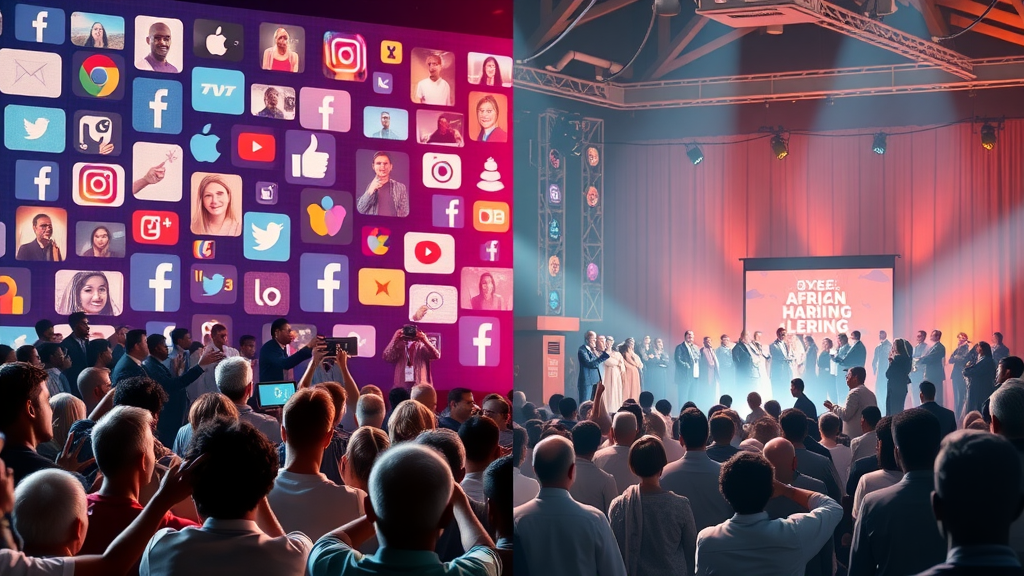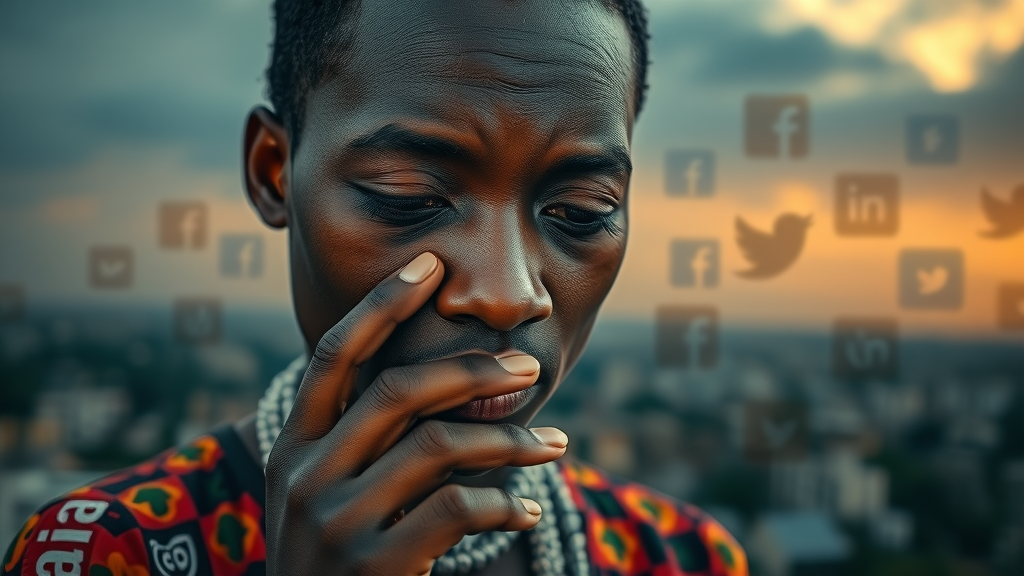Did you know that most African media leaders might be unknowingly building their brands on unstable foundations that could vanish overnight? This is the startling reality of the Digital Sharecropper's Dilemma . For African media empires aiming to thrive and assert control in the digital era, digital sovereignty in Africa is not just a buzzword—it is a strategic imperative to reclaim agency over their digital destinies. In this comprehensive guide, we unravel the complexities of digital sovereignty, demystify the MVR Mandate, and offer actionable strategies to help African media pioneers build resilient, independent digital fortresses.
Startling Realities: The Digital Sharecropper's Dilemma in Africa
Explore the concept of digital sharecropping and its impact on African media leaders
Understand why building brands on third-party platforms risks losing control
Highlight the systemic biases in global social media algorithms affecting African businesses
In today's interconnected world, many African media entrepreneurs unknowingly operate as digital sharecroppers—hardworking cultivators on digital soil that they do not own. Instead of owning the platforms where their audiences reside, they rely disproportionately on third-party social media services like Instagram, TikTok, and LinkedIn. While these platforms offer vast reach, they come with hidden dangers. Algorithm changes and platform policies can abruptly cut off access to audiences, leaving businesses vulnerable and powerless.
According to the senior strategist from The Africa Chronicle Media Agency, "When you build your entire brand on Instagram, LinkedIn, or TikTok, you're essentially a sharecropper on someone else's land. You're working incredibly hard to build an audience, but you own nothing." This predicament is especially acute for African businesses already facing systemic biases embedded in global algorithms that unintentionally marginalize their reach and growth.

Cinematic illustration of an African entrepreneur contemplating digital barriers imposed by social media platforms.
What is Digital Sovereignty in Africa? Defining the New Media Paradigm
Define digital sovereignty and its importance for African media empires
Explain the concept of owning digital real estate: websites, email lists, and content channels
Quote: "Digital Sovereignty is about building an owned media platform that becomes your digital fortress," explains the senior strategist from Africa Chronicle
Digital sovereignty in Africa means establishing full ownership and control over your digital presence. Rather than renting attention and audiences from social media giants, African media empires must create and govern their own digital real estate, such as websites, email subscriber lists, and owned content distribution channels. This concept extends beyond mere presence—it’s about fortifying one's digital domain against external disruptions and algorithmic biases.
The Africa Chronicle Media Agency's senior strategist describes digital sovereignty as "building an owned media platform that becomes your digital fortress." This fortress safeguards your direct relationships with your audience and protects your brand’s legacy and communication channels from unpredictable changes on third-party platforms.

Photorealistic image of African media professionals collaborating to build digital sovereignty.
As you consider the importance of owning your digital assets, it's equally vital to recognize the common pitfalls that can undermine these efforts. For a deeper look at the most frequent errors made by African entrepreneurs in digital media, explore the 12 critical mistakes African entrepreneurs make in digital media ownership and learn how to avoid them on your path to sovereignty.
The MVR Mandate: Minimum Viable Relationship with Your Audience
Introduce the MVR Mandate as a strategic framework for audience ownership
Discuss the three pillars: website, email list, and content creation process
Emphasize the risks of dependency on third-party platforms
The MVR Mandate —Minimum Viable Relationship—is a cornerstone strategy for African media empires striving for digital sovereignty in Africa. This mandate promotes owning at least three critical pillars: a dedicated website, a comprehensive email list, and a consistent content creation process. Together, these pillars form a resilient infrastructure that fosters long-term, direct connections with audiences, independent of social media algorithms.
Reliance on platforms whose rules are opaque and ever-changing puts brands at high risk. An algorithm tweak could instantly reduce outreach, or even remove access to followers altogether, jeopardizing years of hard-earned trust and engagement. The MVR Mandate encourages African leaders to build lasting digital relationships where control and communication are self-determined.

High fantasy-style image showcasing the contrast between digital sharecropping and digital sovereignty.
Digital Sovereignty vs. Digital Transformation: Understanding the Differences
Clarify how digital sovereignty differs from general digital transformation
Discuss how digital infrastructure supports sovereignty efforts
Highlight the importance of owning infrastructure for sustainable economic growth
While digital transformation focuses broadly on integrating technology into business processes, digital sovereignty in Africa specifically emphasizes control and ownership of digital assets and channels. Digital transformation might improve efficiency, but without sovereignty, African media businesses remain vulnerable to external dependencies.
Owning digital infrastructure—servers, data centers, and communication networks—is vital to achieving sovereignty. It enables greater economic control, reduces susceptibility to foreign interference, and fosters reliable access to the digital economy’s benefits. Without such control, businesses are at the mercy of external forces that may hinder sustainable growth and media independence.
The Role of Digital Infrastructure in African Media Independence
Examine current digital infrastructure challenges in African countries
Discuss shared digital infrastructure as a solution to close the digital divide
Quote: "Shared digital infrastructure is emerging as the smartest, fastest path to closing the gap," notes the expert strategist
Many African countries face significant digital infrastructure challenges including limited broadband access, outdated facilities, and high costs. These hurdles hinder media enterprises from fully controlling their digital assets. However, pooling resources through shared digital infrastructure initiatives offers a promising solution by enabling access to affordable, high-quality connectivity and hosting services.
The Africa Chronicle strategist emphasizes, "Shared digital infrastructure is emerging as the smartest, fastest path to closing the gap," recognizing collaboration’s role in accelerating digital sovereignty for media leaders continent-wide.

Cinematic image of a key data center representing Africa’s digital infrastructure.
Building a Media Empire: Strategies for African Leaders to Achieve Digital Sovereignty
Step-by-step guide to establishing owned media platforms
Best practices for growing and maintaining an email list
Content creation strategies that reinforce brand independence
Building a sovereign media empire requires African leaders to take concrete steps toward owning their digital domains. First, launch a dedicated website optimized for user experience and search engine visibility. Second, cultivate an email list by offering valuable content and incentives that encourage sign-ups and foster loyalty. Third, develop a content creation strategy tailored to your audience’s interests, ensuring consistent engagement that strengthens your brand's voice and visibility outside social media dependence.
These efforts combine to form an ecosystem where media brands can thrive on their own terms, turning their audience relationships into sustainable assets that resist digital disruptions.

Portrait of an African woman leader sharing digital strategies to empower media empires.
Avoiding Common Pitfalls: Lessons from Digital Sharecroppers
Identify common mistakes African entrepreneurs make by relying on rented digital land
Discuss the consequences of algorithm changes on brand visibility
Expert advice: "The time for Digital Sovereignty is now," urges the Africa Chronicle strategist
Many African entrepreneurs fall into the trap of building entire brand presences solely on social platforms with rented digital land. This leaves them exposed to sudden shifts in algorithm policies that can drastically reduce visibility or erase follower counts overnight. The consequences include lost revenue, weakened audience trust, and stifled brand growth.
The expert from The Africa Chronicle Media Agency warns, "The time for Digital Sovereignty is now." This call to action underscores the urgent need to break away from reliance on external platforms and regain control over digital assets and customer relationships.

Expressive 2D cartoon depicting the risks of dependence on social media algorithms for African media brands.
Economic Growth and Digital Sovereignty: Unlocking Africa’s Potential
Analyze how digital sovereignty contributes to sustainable economic growth
Explore case studies of African countries advancing digital independence
Discuss the broader impact on media freedom and cultural representation
Digital sovereignty in Africa is not merely a technological concern—it is a pivotal driver of sustainable economic growth. By owning their digital infrastructure, content, and audience channels, African media enterprises can capture greater value within the digital economy, create jobs, and cultivate authentic narratives that resonate globally.
Countries actively pursuing digital independence have seen improved media freedom and local cultural representation flourish, reclaiming narratives from colonial and external perceptions. This decolonial shift is vital to empowering African voices on digital platforms and beyond.

Vibrant image illustrating the economic promise of digital sovereignty and growth in Africa.
The Decolonial Blueprint: Reclaiming African Media Narratives
Explain the decolonial approach to digital sovereignty
Highlight the importance of narrative control in media empires
Quote: "Building our empires on foundations we control is essential for true independence," states the expert
The decolonial blueprint for digital sovereignty in Africa advocates reclaiming control over media narratives long shaped by colonial and external forces. Taking charge of digital platforms enables African media empires to craft authentic stories that reflect their histories, cultures, and visions for the future.
The senior strategist emphasizes, "Building our empires on foundations we control is essential for true independence." This philosophy stresses that owning the means of digital storytelling is a vital step toward media freedom and self-determined identity on the global stage.

Lifelike image of an African journalist empowered by digital media tools, personifying narrative control.
People Also Ask: Common Questions About Digital Sovereignty in Africa
What is digital sovereignty and why is it important for African media?
Digital sovereignty in Africa is the ownership and control of digital assets like websites, email lists, and content channels. It’s important because it safeguards media empires from disruptions caused by third-party platforms and algorithmic biases, ensuring longevity and independence.How can African leaders build owned media platforms?
Leaders can start by creating a professional website, growing an engaged email list, and consistently producing original content that resonates with their audience. These steps help establish direct and lasting relationships beyond social media.What are the risks of relying on social media algorithms?
Dependency exposes businesses to sudden drops in reach or even complete loss of audience access due to opaque algorithm changes, policy shifts, or platform shutdowns, jeopardizing brand visibility and revenue.How does digital infrastructure affect media independence?
Owning or having access to robust digital infrastructure—like data centers and connectivity—enables media enterprises to maintain control over content distribution and reduce reliance on external providers.What is the MVR Mandate and how does it protect audience relationships?
The MVR Mandate (Minimum Viable Relationship) advocates owning a website, an email list, and a content creation process to maintain direct, reliable connections with audiences, minimizing dependence on third-party platforms.

Vibrant image of an engaged African tech community discussing digital sovereignty topics.
What You'll Learn: Key Takeaways from This Guide
Understanding the digital sharecropper problem and its implications for African media leaders
The critical components of digital sovereignty in Africa including owned media platforms and infrastructure
Strategic steps to build and maintain owned media platforms ensuring resilience and audience control
The role of digital infrastructure as a foundation for media independence and sustainable growth
How digital sovereignty drives economic growth and cultural empowerment in African media markets
Comparison of Digital Sharecropping vs Digital Sovereignty in Africa |
||
Aspect |
Digital Sharecropping |
Digital Sovereignty |
|---|---|---|
Ownership |
None - reliant on third-party platforms |
Full ownership of digital assets |
Audience Control |
Dependent on platform algorithms |
Direct relationship with audience |
Risk |
High risk of sudden loss |
Sustainable and controlled growth |
Infrastructure |
External and shared |
Owned or controlled infrastructure |
Conclusion: Embracing Digital Sovereignty to Secure Africa’s Media Future
Summarize the urgency of adopting digital sovereignty
Reinforce expert insights on building resilient media empires
Call to action encouraging African founders to start building their digital fortresses
"Most founders can't answer 'yes' to whether their business would survive the loss of social media platforms, and that's terrifying," warns the senior strategist from Africa Chronicle.
"The time for Digital Sovereignty is now," emphasizes the expert, highlighting the critical need for African media independence.
It is clear that the era of digital sharecropping is fraught with peril. African media leaders must urgently pivot towards owning their platforms, infrastructure, and narratives. Only by embracing digital sovereignty in Africa can they craft unstoppable media empires that preserve independence, cultural vitality, and economic empowerment for generations to come.
For African founders and media leaders ready to take the next step, the journey toward digital sovereignty is just the beginning. By deepening your understanding of the broader strategies that underpin media independence, you can unlock new opportunities for growth, resilience, and cultural impact. Explore advanced frameworks, discover innovative approaches, and connect with a community of visionaries who are shaping the future of African media. Let your commitment to ownership and narrative control inspire a new era of digital empowerment across the continent.
Ready to Build Your Digital Fortress?
Explore strategic insights tailored specifically for African founders seeking digital independence
Visit The Founders Africa for expert guidance and resources
Start your transformative journey towards full digital sovereignty in Africa today and secure your media empire’s future
To deepen your understanding of digital sovereignty in Africa, consider exploring the following resources:
The article “ World Bank backs Africa digital data push with $100 million Raxio deal ” discusses the International Finance Corporation’s significant investment in Raxio Group to enhance digital infrastructure across Africa, highlighting efforts to boost local data hosting and strengthen cybersecurity.
The “ African Declaration on Internet Rights and Freedoms ” provides a comprehensive framework promoting an internet environment that aligns with human rights standards and supports Africa’s social and economic development needs.
If you’re serious about understanding and achieving digital sovereignty in Africa, these resources will offer valuable insights and strategies to guide your efforts.
 Add Row
Add Row  Add
Add 




Write A Comment